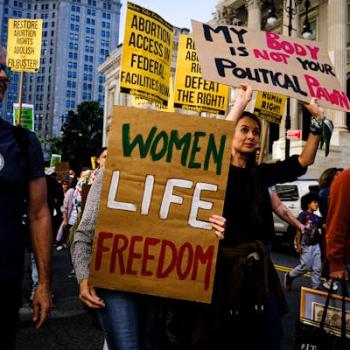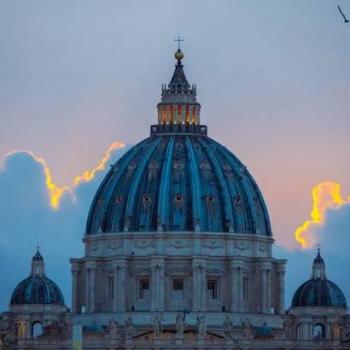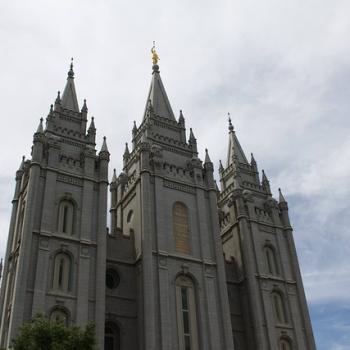JOHN (the perfect name for this question) ASKS:
I thought the John of Revelation was the Beloved Disciple. The sermon today tried to disabuse me of that notion. What do we know about this?
THE RELIGION GUY’S ANSWER:
One cherished Christmas tradition is dramatic presentation of the story of Jesus via Handel’s “Messiah,” the most-beloved, most-performed musical setting of Bible verses ever composed. This 1742 oratorio concludes with a stirring chorus taken from the Book of Revelation 5:9,12-14 in the King James Version:
“Worthy is the Lamb that was slain and hath redeemed us to God by his blood, to receive power, and riches, and wisdom, and strength, and honor, and glory, and blessing…. Blessing and honor, glory and power, be unto him that sitteth upon the throne, and unto the Lamb, for ever and ever…. Amen.”
Who received this book’s elaborate vision and wrote it down? That’s among many mysteries about Revelation, a.k.a. the Apocalypse, along with what its many lurid symbols mean, and whether it addresses 1st Century persecution, church struggles throughout history, future culmination in the end times, or some combination. The early church, especially in the East, was reluctant and late in deciding this unusual book belonged in the New Testament.
The text names the writer as a “John” who lived on the island of Patmos off the coast of Asia Minor (present-day Turkey) due to “tribulation” and testimony to Jesus Christ, indicating he was in forced exile. There is early and strong tradition that this was John, the “beloved” apostle among the Twelve chosen by Jesus, though the text doesn’t say so. That belief was embraced by a parade of 2nd and early 3rd Century notables including Justin Martyr, Clement of Alexandria, Irenaeus, Origen, and Tertullian. A present-day conservative, Walter Elwell of Wheaton College in Illinois, is less absolute but thinks the apostle is “quite likely” the author.
But, as with many biblical questions, the situation is complicated. The 3rd Century Bishop Dionysius, as cited in the early 4th Century “Ecclesiastical History” by Eusebius, ruled out the apostle due to the book’s character, thought, language, construction, and rough Greek idioms and grammar. Some modern literary critics agree. But the grammar argument didn’t sway the late G.B. Caird of Oxford University. His 1966 commentary contends that Revelation “is not ungrammatical, but has a grammar of its own, unparalleled in any other ancient writing, but nonetheless real and consistent,” that reflected a writer “thinking in Hebrew” while writing in Greek.
Important early evidence on this, also in Eusebius’s history (Book 3, chapter 39) reports debated assertions about New Testament authorship from the early 2nd Century Bishop Papias. He indicated there were two noted figures who shared that very common name, the apostle and a second person:
“The other John he mentions after an interval, and places him among others outside the number of the apostles, putting Aristion before him, and he distinctly calls him a presbyter… This shows that the statement of those is true who say that there were two persons in Asia that bore the same name… It is probable that it was the second, if one is not willing to admit that it was the first that saw the Revelation, which is ascribed by name to John.”
Donald Hagner (“The New Testament: A Historical and Theological Introduction,” 2012) finds it “highly unlikely” that “John” was a pseudonym of someone, and concludes the writer was only “possibly” the “presbyter” and “improbably” the apostle. So there could have been some third “John” who is otherwise unknown to us. However, the writer simply states his name without elaboration, suggesting he was well-known in that time and place and needed no introduction. Hagner’s fellow moderate conservative Richard Bauckham at the University of St. Andrews says “there is no reason” to identify the author with the apostle.
Adela Yarbro Collins, a Revelation specialist at the University of Notre Dame, considers it “unlikely” that one of Jesus’ apostles still living would have phrased 21:14 this way: “The wall of the city had 12 foundations, and on them the 12 names of the 12 apostles of the Lamb.” Caird agrees, and adds that the writer doesn’t identify himself as an apostle, nor does he “appeal to apostolic authority.”
German exegete Loren Stuckenbruck concludes that “the precise identity of ‘John’ remains unknown.” Caird likewise thinks we simply don’t know, yet “nothing more than curiosity” is at stake because the book’s “authority would be neither increased if [the apostle’s] authorship could be proved, nor diminished if it were disproved.”
To him, it’s far more important for correct interpretation whether the vision was received during the church persecution under the Emperor Nero (A.D. 54 – 68) or, in the majority view, under the equally bloodthirsty Emperor Domition (A.D. 81 – 96). The earlier Nero dating could be suggested by omission in 11:1-2 of the destruction of the Jerusalem Temple in A.D. 70.
A final word comes from the late G.R. Beasley-Murray, principal of Spurgeon’s Theological College in London. He thought we can neither affirm nor deny the apostle as the writer, but “the authorship of this book is the least important question” regarding it.
(Note: To some extent this topic also involves whether the apostle wrote the more polished “Gospel of John,” which names no author in the text but was traditionally attributed to the apostle of that name. This matter is too complex to handle here, but the Religion Guy will gladly tackle it if someone posts such a question on this site.)










